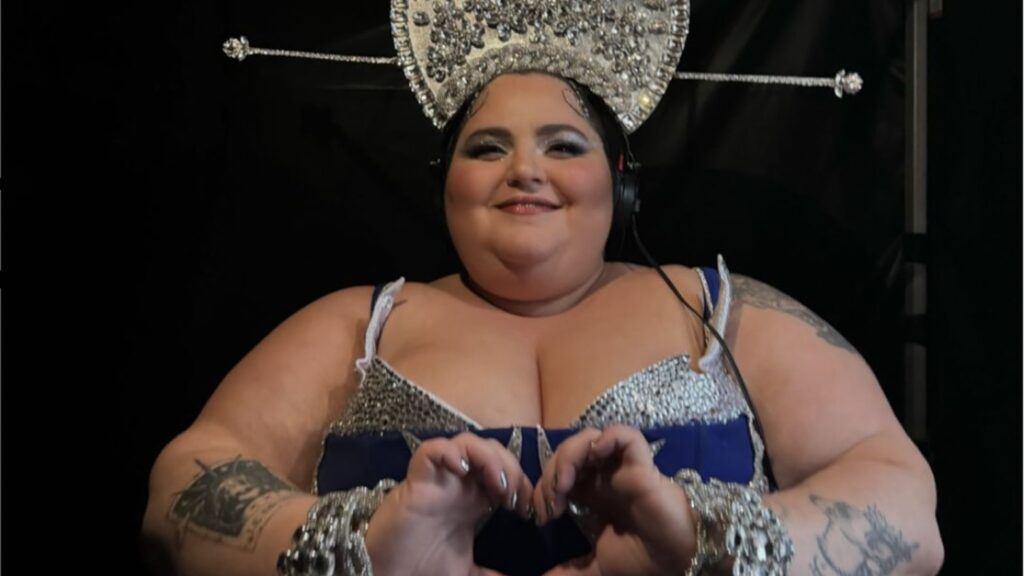by Edward Hudgins
The Olympics is the premiere global event highlighting and celebrating physical fitness and athletic prowess. The Paris Olympics opened with a live parody of DaVinci’s famous Last Supper fresco with a collection of freaks in place of the disciples. Whether or not one considers this religious sacrilege, it might well be secular sacrilege.
In place of Jesus in the parody was Barbara Butch, a morbidly obese individual. When I saw this, my thoughts went to my loving sister.
Joan, with a big smile and a big heart, died in 2009, a few weeks after her 53rd birthday, from diabetes and morbid obesity. That morning in February, because she wasn’t answering her phone, my parents had stopped by her place to check on her. I received the anguished phone call from them telling me they had found her dead in her bed. She’d lost a lot of weight, was looking a lot better, and was on a good path, but it was too little, too late.
Apart from shocking audiences, the producers of the parody would argue that they included the obese faux Jesus to promote “inclusion” and to push back against “fat shaming.” Let’s have a serious discussion of the issues involved.
First, American health officials estimate that some 60 to 70 percent of us are overweight or obese. These figures are somewhat inexact; Olympic athletes, in top health, can be rated obese because of their excess muscles. Furthermore, the impact of a little extra weight varies among individuals, so don’t obsess too much about every pound. Still, overweight and obesity are major contributors to the decline in life expectancy in recent years in the U.S. and today’s health crisis. Indeed, obesity is associated with a rising level of heart attacks and strokes in women under 50, health crises that could kill Barbara Butch.

Second, those who use the terms “inclusion” and “fat shaming” often seek to censor serious discussion of weight issues and denounce those who don’t celebrate obesity. They should be ashamed of themselves for placing their dogma ahead of the lives and well-being of real, flesh-and-blood individuals. While obesity might not be a sin, the saying “Hate the sin, love the sinner” is on the mark. Here, also, is the truth that “To love the sin is to hate the sinner.” How would family and friends feel if they found obese Barbara Butch dead in her bed?
Third, we should not make fun of overweight individuals as this turns them off to any constructive advice or paths we might offer them. You can still love them, enjoy their company, and accept them for all their other virtues. But it is okay—indeed, an act of love—to help them take steps to change themselves.
Fourth, we should understand that they will often resist our advice. It is a truly delicate task to help a loved one to come to grips with weight problems.
Fifth, it’s important to oppose government policies, touted as promoting “inclusion,” that actually reward self-destructive life-style choices, obesity being on the top of the list. New York City recently banned discrimination in hiring based on weight. This regulation might well spill over into bans on health insurance provided by employers to provide incentives for healthy choices. “Non-discrimination” here can mean that a 400 lb. sedentary junk food addict pays a similar rate as those who exercise regularly and eat healthy.
Sixth, governments dictating diets is not the path to losing weight, either. My healthy self does not want food police at my door when I bake my holiday cookies. And many government efforts already are responsible for much misery and death. Notably, antiquated Food and Drug Administration regulations keep safe, promising and desperately needed treatments out of the hands of patients, resulting in thousands of deaths per year.
Seventh, it is events like the Olympics that can celebrate in our culture the virtues of fitness and health. The Olympics undermined its “Admire these athletes” message when it offered an obese provocateur in an “Isn’t she cool to be fat” parody. Those athletes have the strongest wills and perseverance, training for years to develop physical strength and skills to compete. These are virtues that would benefit obese-Jesus types.
Eighth, we are entering an era in which biotechnology, integrated with artificial intelligence, is discovering ways to cure ailments that have plagued humanity throughout the ages, and even to slow down, stop, or reverse aging itself. This biotech revolution should vanquish the seeming futility of fighting the ravages of ailments and death that perhaps leads many to “Eat, drink, and be merry, for tomorrow we shall die” feelings that can lead to obesity and years of suffering and early death.
Yes, eat, drink, and be merry, but responsibly, with the prospect of living well past 100 in great health. Don’t throw away many extra decades of joy that technology can offer. It’s too late for my sister Joan, but not for Olympic-mocking Barbara Butch and so many others.
—————

Edward Hudgins, Ph.D., is founder of the Human Achievement Alliance and an expert on technology, FDA reform, and healthcare policy. His career includes stints at the Heritage Foundation, Joint Economic Committee of Congress, the Cato Institute, the Atlas Society, and the Heartland Institute.